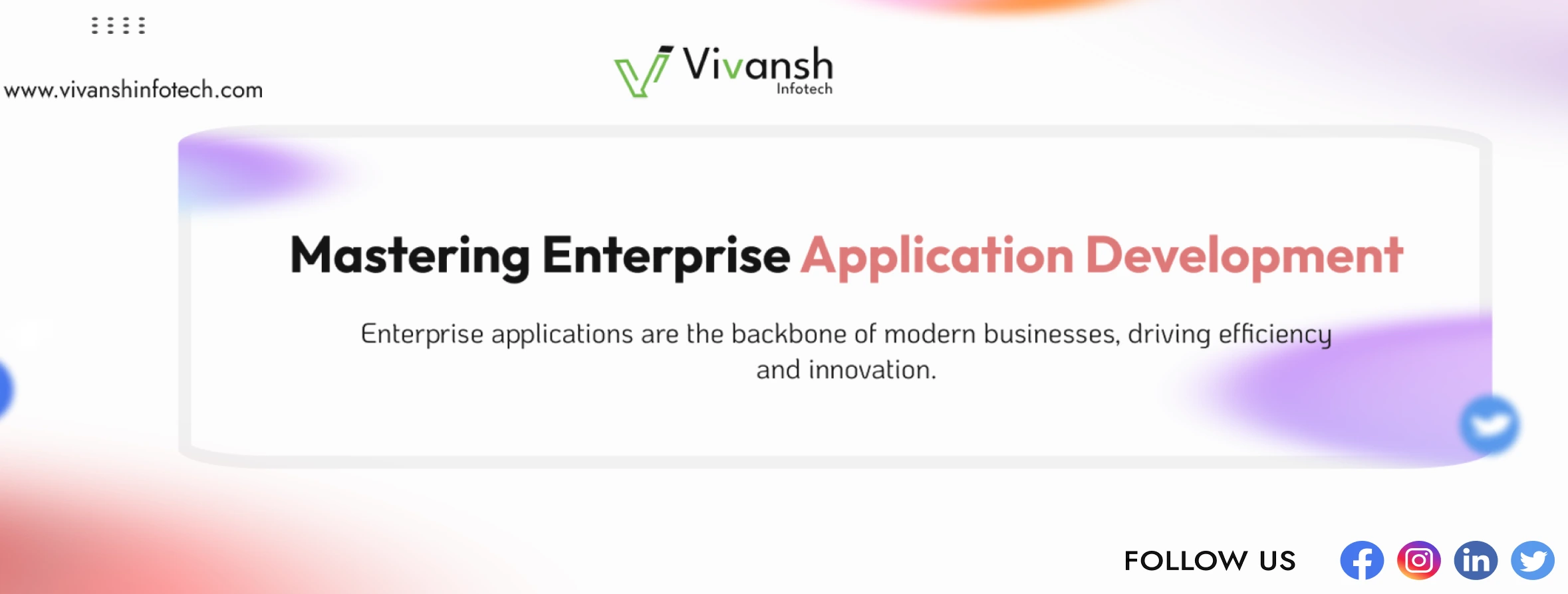Unleash the power of business application development
22 Jul 2024

Unleash the power of business application development
In today's fast-paced digital landscape, enterprise application development stands as a pivotal force driving innovation, efficiency, and competitiveness in businesses across various industries. From streamlining operations to enhancing customer experiences, enterprise applications empower organizations to achieve their goals more effectively. In this blog, we'll explore the significance, benefits, and key considerations of enterprise application development, and how businesses can harness its power to thrive in the modern marketplace.The Significance of Enterprise Application Development
Enterprise applications are software solutions designed to address specific business needs and processes at scale. Unlike consumer applications, which are often tailored for individual use, enterprise applications serve entire organizations, integrating various functions and departments into a cohesive system. These applications can range from customer relationship management (CRM) systems and enterprise resource planning (ERP) solutions to custom applications that address unique business challenges.Why Enterprise Applications Matter
-
1. Efficiency and Productivity:To make that a headless CMS we remove the template element (4.) from the stack as that is the context of that CMS - the actual website. Once that is done, we can replace it with the RESTful or GraphQL API accessed by other systems to access the data stored in the Admin UI. Et voilà: you have now received a headless CMS.
-
2. Data-Driven Decision Making:Enterprise applications collect and analyze vast amounts of data, providing actionable insights that help businesses make informed decisions and drive strategic initiatives.
-
3. Enhanced Collaboration:Enterprise applications are built to grow with the organization, allowing businesses to scale their operations without the need for frequent software overhauls.
-
4. Scalability:Enterprise applications are built to grow with the organization, allowing businesses to scale their operations without the need for frequent software overhauls.
-
5. Competitive Advantage:By leveraging advanced technologies and innovative solutions, businesses can stay ahead of competitors, adapt to market changes, and meet evolving customer demands.

Key Benefits of Enterprise Application Development
-
1. Customization and Flexibility:One of the primary advantages of enterprise application development is the ability to create tailored solutions that align with specific business needs. Off-the-shelf software often lacks the flexibility to adapt to unique workflows and requirements, whereas custom applications can be designed to fit seamlessly into existing processes.
-
2. Integration Capabilities:Enterprise applications can integrate with other systems and platforms used within the organization, creating a unified ecosystem. This integration ensures smooth data flow between different departments and functions, reducing redundancies and improving overall efficiency.
-
3. Improved Security:Security is an important issue for businesses that handle sensitive data. Enterprise applications are designed with robust security measures to protect against data breaches and unauthorized access. Custom solutions can also be tailored to meet specific compliance requirements, ensuring regulatory adherence.
-
4. Enhanced User Experience:User experience (UX) is a key factor in the success of any software application. Enterprise applications are developed with a focus on intuitive interfaces and user-friendly designs, making it easier for employees to adopt and use the software effectively.
-
5. Cost Efficiency:While the initial investment in enterprise application development may be higher than purchasing off-the-shelf software, the long-term benefits often outweigh the costs. Custom solutions eliminate the need for multiple software licenses, reduce manual labor, and improve operational efficiency, resulting in significant cost savings over time.
Key elements of successful business application development
-
1. Define Clear Objectives:Before embarking on an enterprise application development project, it's essential to define clear objectives and goals. Understand the specific pain points and challenges the application aims to address, and establish measurable outcomes to track its success.
-
2. Choose the Right Development Partner:Choosing a development partner is critical to the success of your business application.Look for a partner with a proven track record, expertise in relevant technologies, and a deep understanding of your industry.
-
3. Prioritize User-Centric Design:A user-centric approach to design ensures that the application meets the needs and expectations of its end-users. Conduct user research, gather feedback, and involve stakeholders throughout the development process to create an application that delivers real value.
-
4. Ensure Scalability and Flexibility:Design the application with scalability in mind, allowing it to grow with your organization. Choose technologies and architectures that support flexibility, enabling easy updates and enhancements as business needs evolve.
-
5. Focus on Security and Compliance:Implement robust security measures to protect sensitive data and ensure compliance with industry regulations. Conduct regular security audits and stay updated with the latest security best practices to mitigate potential risks.
Conclusion
Enterprise application development is a powerful tool that can transform businesses, driving efficiency, innovation, and growth. By leveraging custom solutions tailored to specific needs, organizations can unlock new opportunities, streamline operations, and stay ahead of the competition. As businesses continue to navigate the complexities of the digital age, investing in enterprise application development will be a key driver of success and a cornerstone of sustainable growth.Unlock the full potential of your business with enterprise application development, and embark on a journey towards a more efficient, collaborative, and data-driven future.







